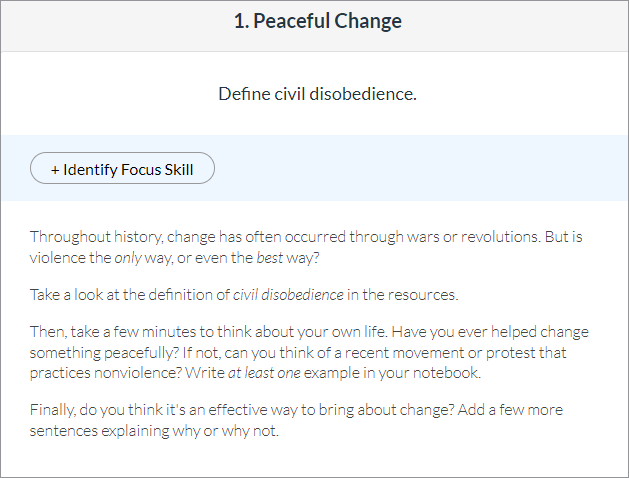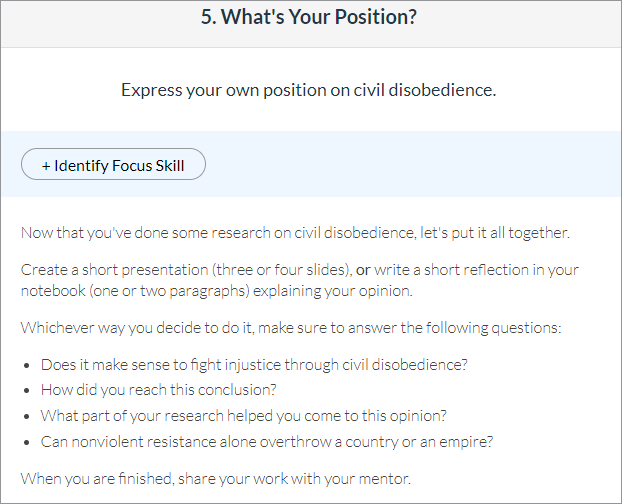Get to know the Learning Skills that help students REASON
In our last two posts we focused on strategies and activities to help students build skills as they Explore and Analyze.
In this post we focus on a third category of skills, Reason, which includes the following Learning Skills:
- Assess Arguments: Evaluate arguments, points of view, and positions with attention to evidence and reasoning.
- Take a Position: Develop your own position. Support it with appropriate evidence and reasons and defend it from the criticism of others.
- Reflect: Reflect upon actions and experiences, recognize strengths and shortcomings, and identify ways to improve.
Take a look at examples of what these skills look like in practice.
Assess Arguments
Whether they realize it or not, students assess arguments every day: an online advertisement for the newest Nike shoe, a friend imploring them to stay out past curfew, or a parent insisting they complete a school project on time.
Assessing an argument involves determining whether it’s valid or sound. This is a fundamental part of most academics: debate, essay writing, formulating mathematical proofs. What my students needed, though, was to see how assessing arguments in class could also help them assess arguments in their personal lives. Making that connection empowered them to be critical of every argument presented (both in the classroom and in their personal lives!). I often asked students to assess arguments by using four simple questions:
- Who is making the argument?
- What gives them the authority to make the argument?
- What evidence is given in support of the argument?
- Does the evidence come from a reliable source?
Learning how to analyze and critically evaluate arguments in school allows students to develop a sound framework to test their own arguments and advance their own points of view – in all areas of their lives.
Examples of assessing arguments in the classroom include:
- Recognizing point of view and the role of context in an argument
- Understanding how bias or motive affects a scientific conclusion or mathematical claim
- Explaining how specific evidence supports an argument
- Describing the limitations of data and design experiments to support a claim
Take a Position
The work of assessing arguments leads nicely into students practicing the skill of taking a position. After all, how can a student take a strong position without first making sure their argument is sound, with solid evidence?
Check out this example of students taking a position in a quest from our Foundations of English course: Is Violence the Answer? Students begin by defining and forming an initial position on civil disobedience.

Then, students research, evaluate, and assess real life examples of civil disobedience to alter or refine their initial position.

Other ways students can take a position include:
- Creating a claim for an essay with evidence to support it, and including a counterclaim
- Building on the viable arguments of others to refine an approach or position
- Determining a conclusion after testing a hypothesis, conducting experiments, and collecting data
- Identifying and supporting choices for algorithms and formulas based on a given context
Reflect
Reflection is the process of exploring and examining ourselves, our perspectives and the world around us. Reflection is an important skill that often gets overlooked in classrooms packed with content and standardized testing.
My students struggled with reflection. I noticed they found it difficult to be honest with themselves about their learning experiences. I encouraged them to see that reflection gives them an opportunity to pause amidst the chaos in their minds, explore observations and experiences, consider multiple perspectives, and create meaning to inform future learning. This reflective process is crucial to students’ ongoing growth and development.
One way to help students reflect is by building it into the feedback process. After students receive feedback they can reflect by answering questions such as:
- What is something you did well?
- What questions do you have about the feedback you received or about improving your draft?
- What will you do next to improve your draft and skills? Be specific!
You can also give students sentence starters to help answer the questions. For example:
- I am proud that I __.
- I would like to know more about __.
- To improve ___, I will ___.
Student reflection can take various forms, including:
- Exploring how the world around them influences their own personal thinking and decision making
- Understanding how their own personal words and actions affect those around them
- Identifying strengths and areas for improvement
- Monitoring and documenting progress
- Creating and asking questions about an assignment or activity
Stay tuned for our next post about the fourth, and final, group of Learning Skills: Communicate.

